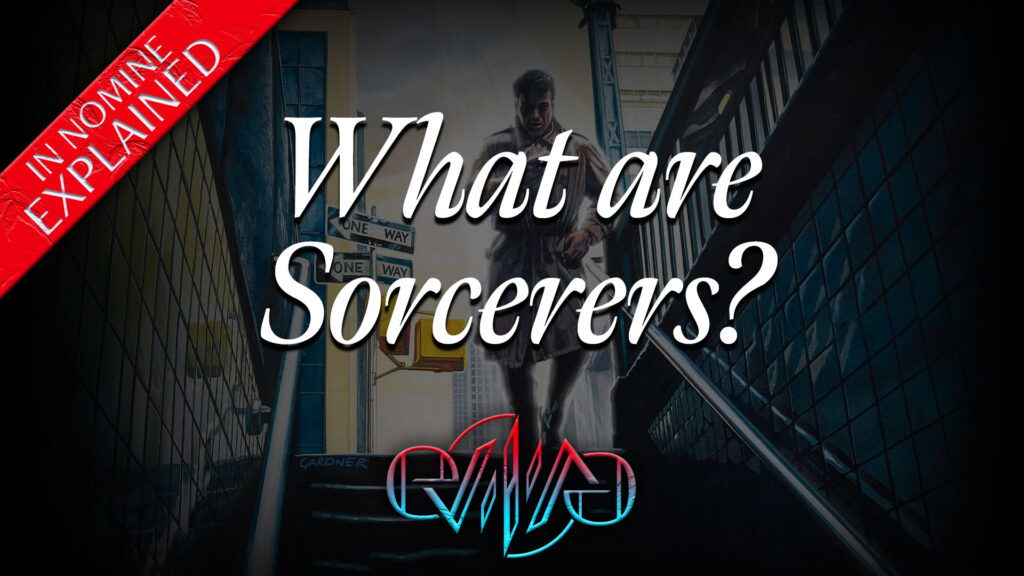Let’s learn all about Sorcerers in the tabletop role-playing game In Nomine. In Nomine is a role-playing game designed by Derek Pearcy and published in 1997 by @Steve Jackson Games. You can learn more on the official website here: http://www.sjgames.com/innomine/ or the Wikipedia page here: https://en.wikipedia.org/wiki/In_Nomine_(role-playing_game). You can buy In Nomine products here: https://www.drivethrurpg.com/browse/pub/12199/Steve-Jackson-Games/subcategory/28908_30775/In-Nomine?affiliate_id=50797
Time Stamps:
- 0:00 Intro
- 1:11 What are sorcerers?
- 2:45 What is sorcery?
- 3:58 Who can be a sorcerer?
- 5:53 Can sorcerers be good?
- 7:08 Outro
About In Nomine
Written by Derek Pearcy + Illustrated by Dan Smith
Edited by Jeff Koke, Steve Jackson, and Susan Pinsonneault
Cover art by John Zeleznik (first printing) and Christopher Shy (second printing)
In Nomine is a modern roleplaying game in which the players take the part of celestial beings – angels and demons – as they struggle for control of humanity and themselves. The celestials, powerful though they may be, are merely pawns in a much larger game being played by their Superiors, the Archangels and Demon Princes. Based on the best-selling French RPG by the wonderfully diabolical Croc!
In Nomine won the Origins Award for Best Graphic Presentation of a Roleplaying Game, Adventure, or Supplement of 1997.
Transcript
Cold Open
They are able to tap into the Symphony without even being aware of it!
Intro
Welcome to Eviliv3, the live media commentary show that answers the question, are Songs and sorcerous rituals the same thing? Subscribe if you’re new to the channel, because today we are continuing our In Nomine series with this episode, Sorcerers.
Discussion
Sorcery is a touchy subject for celestials, as they are not quite sure how mortals are able to make the universe do what they want. Before the Fall, God even forbade the teaching of Songs or attunements to humans. However it is inevitable that any exposure to Celestials will create a desire in mortals to replicate the fantastic power they exercise. Whether humans were exposed to celestial power directly or whether there was some form of commerce between Ethereal spirits which Angels couldn’t prevent, or if humans invented sorcery themselves seems to be less relevant. What is relevant to Angels however, is that while sorcery is not inherently diabolical, practicing sorcery puts one at odds with the Divine!
What are Sorcerers?
Sorcerers are mysterious and inscrutable; their powers rarely work in a blatant fashion, and they don’t dare use their abilities openly, fearing both public exposure and celestial intervention. They are a secretive lot who are known more by rumor than by fact. Sorcerers contribute to their own aura of mystery, and diabolicals help them, spreading rumors and disinformation to confuse both
humans and other celestials. Most sorcerers rarely do more than scratch the surface of the art.
Sorcerers are Symphonically aware, but largely ignorant of the true Symphony, and rarely do they know anything about the War. They hear disturbances as the clashing of otherworldly powers, a maddening Cacophony. Some summon demons and ethereal spirits, but create their own nomenclature for these beings – Heaven and Hell don’t fit into a sorcerer’s worldview, except as abstractions, and most know little about real angels and demons.
Whatever role sorcerers imagine for themselves, however, they are more often than not pawns in the War – usually playing on the black side of the board. This also means many sorcerers even know Songs, even if they don’t know the difference between sorcery and Songs. Sorcery and enchantment are two separate domains, but with considerable overlap. Not all sorcerers are enchanters, and not all enchanters are sorcerers, but most human practitioners are both. Thus, a pure alchemist or necromancer might not technically be a sorcerer.
What is sorcery?
Just like Songs, sorcery appears to be magic, but also like Songs, sorcery is not magic. Rather, it is a laborious, ego-driven method of playing Symphonic chords. Yes, this is similar to what songs do, but it is different. Even some celestials believe that sorcery is simply an indirect method of performing Songs, the song being buried beneath layers of arcane abstraction, extraneous ceremony, and distorted perceptions of the Symphony. And sorcery is far less efficient than playing songs, so perhaps there is some truth to that assumption. However, sorcery can only mimic effects of Ethereal and Celestial songs, and in some cases, sorcery can achieve things that no Song can even achieve, and no celestial likes that idea!
So what is sorcery? Well, the few sorcerers who know about the Symphony theories that sorcery is drawn directly from human will. Just like humans can create Tethers and strengthen and weaken Words through their collective conscience, some individuals can have a direct impact through their strong will, on the Symphony.
Who can be a sorcerer?
Only humans can be sorcerers, and only humans with six forces at that! In extremely rare cases soldiers may be sorcerers. Even Undead, as they were once mortal, are able to be sorcerers. There are two ways to become a sorcerer. One way is to be Initiated. The other is to sell your soul to Hell. Initiates usually wind up in Hell anyway – they just sell their souls in installments.
They must be symphonically aware and have a minimum will of six. They must know the Sorcery attunement and one or more sorcerous skills in order to perform any rituals. Anyone can learn sorcerous skills, even if they can never be a sorcerer, though there’s no practical use for knowing them unless you can perform rituals. They are all based on Will, and have no default like other skills. At the heart of being a sorcerer is the performance of rituals. This is the sorcerer’s power, and they can be very powerful. There may be endless sorcerous traditions, and names for the rituals, but they all fill the same basic role. Allowing the sorcerer to exert their will on the universe.
A sorcerer most often learns a ritual from another sorcerer, an ethereal spirit or a demon, though some may discover them through long and arduous self-study. Even non-sorcerers may learn them. Some with the promise of discovering how to use them, some for esoteric knowledge, and others who want to use them but never will be able to. It is the performance of the ritual that separates it from Songs, other than its effects. Rituals may take from minutes to hours in order to successfully perform them, and their effects vary from the basic sorcerous skills of banishment, command, exorcism, focus, and summon.
Can Sorcerers be good?
Sorcery is selfishness made manifest. A sorcerer does not have to be evil, but every sorcerer must believe, in the core of his being, that he is entitled to impose his will on the universe and make it serve his own ends. There are no humble, selfless sorcerers. Still, a rare few sorcerers have acted selflessly enough to escape damnation. Then there are the really rare sorcerers – so-called “white sorcerers” who actively work for Heaven.
A white sorcerer must fight a constant battle against his own selfish impulses, and avoid the ever-present lure of greater knowledge and power in exchange for just a few diabolical favors. Furthermore, if he’s cooperating with angels, he needs to keep quiet about it – Servitors of
Kronos and Asmodeus will quickly send a hit team if they find out about a white sorcerer . . . and Dominic isn’t much more tolerant.
So whether you are playing Sorcerers as characters, villains, or tangential non-player characters, they are undeniably part of what makes the In Nomine universe interesting and relatable. I highly recommend using them in your campaigns.
Outro
Thank you for watching today’s In Nomine episode. Subscribe and ring the bell if you are new to the channel. Don’t forget to click the like button and comment to let others learn about this award winning role-playing game and this channel.
And as always, remember that evil spelled backwards is live, so get out there and Be Evil!

